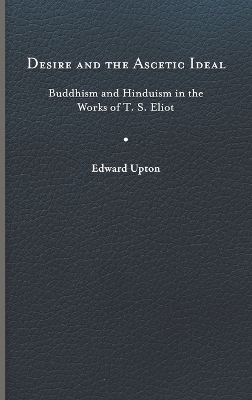
Desire and the Ascetic Ideal
Buddhism and Hinduism in the Works of T. S. Eliot
Seiten
2023
University of Virginia Press (Verlag)
978-0-8139-4998-7 (ISBN)
University of Virginia Press (Verlag)
978-0-8139-4998-7 (ISBN)
Centering on T.S. Eliot’s study of sources from ancient India, this new book offers a rereading of the poet’s work, analysing his unpublished graduate school notebooks on Indian philosophy and exploring Eliot’s connection with Buddhist thought.
The Hindu words "Shantih shantih shantih" provide the closing of The Waste Land, perhaps the most famous poem of the twentieth century. This is just one example among many of T. S. Eliot’s immersion in Sanskrit and Indian philosophy and of how this fascination strongly influenced his work.
Centering on Eliot’s study of sources from ancient India, this new book offers a rereading of the poet’s work, analysing his unpublished graduate school notebooks on Indian philosophy and exploring Eliot’s connection with Buddhist thought. Eliot was crucially influenced by his early engagement with Indian texts, and when analysed through this lens, his poems reveal a criticism of the attachments of human desire and the suggestion that asceticism might hold out the possibility that desire can be cultivated toward a metaphysical absolute. Full of such insights, Upton’s book represents an important intervention in modernist studies.
The Hindu words "Shantih shantih shantih" provide the closing of The Waste Land, perhaps the most famous poem of the twentieth century. This is just one example among many of T. S. Eliot’s immersion in Sanskrit and Indian philosophy and of how this fascination strongly influenced his work.
Centering on Eliot’s study of sources from ancient India, this new book offers a rereading of the poet’s work, analysing his unpublished graduate school notebooks on Indian philosophy and exploring Eliot’s connection with Buddhist thought. Eliot was crucially influenced by his early engagement with Indian texts, and when analysed through this lens, his poems reveal a criticism of the attachments of human desire and the suggestion that asceticism might hold out the possibility that desire can be cultivated toward a metaphysical absolute. Full of such insights, Upton’s book represents an important intervention in modernist studies.
Edward Upton is Associate Professor of Humanities at Christ College, Valparaiso University.
Acknowledgments
Introduction: Eliot and Skillful Means
1. Skillful Means and Asceticism in T.S. Elliot's Critique of Schopenhauer
2. T.S. Eliot's "Ars Religiosa": Transmigration and Faith in Knowledge and Experience
3. India among the Fragments: Pessimism and Desire in "The Waste Land"
4. Language and the Cultivation of Desire in The Fire Sermon
5. Transcendence Revisited: Hallucination and Literary Asceticism
6. Language in the Middle Way: T.S. Eliot's Engagement with Madhyamaka Buddhism in "Four Quartets"
7. Performing the Divine Illusion: Memory, Desire, and the Performance of Form in "Burnt Norton"
Notes
Bibliography
| Erscheinungsdatum | 18.10.2023 |
|---|---|
| Reihe/Serie | Studies in Religion and Culture |
| Verlagsort | Charlottesville |
| Sprache | englisch |
| Maße | 156 x 235 mm |
| Gewicht | 272 g |
| Themenwelt | Geisteswissenschaften ► Religion / Theologie |
| Geisteswissenschaften ► Sprach- / Literaturwissenschaft ► Anglistik / Amerikanistik | |
| Geisteswissenschaften ► Sprach- / Literaturwissenschaft ► Literaturwissenschaft | |
| ISBN-10 | 0-8139-4998-X / 081394998X |
| ISBN-13 | 978-0-8139-4998-7 / 9780813949987 |
| Zustand | Neuware |
| Haben Sie eine Frage zum Produkt? |
Mehr entdecken
aus dem Bereich
aus dem Bereich
Poetik eines sozialen Urteils
Buch | Hardcover (2023)
De Gruyter (Verlag)
CHF 83,90
Buch | Softcover (2024)
belleville (Verlag)
CHF 27,95


